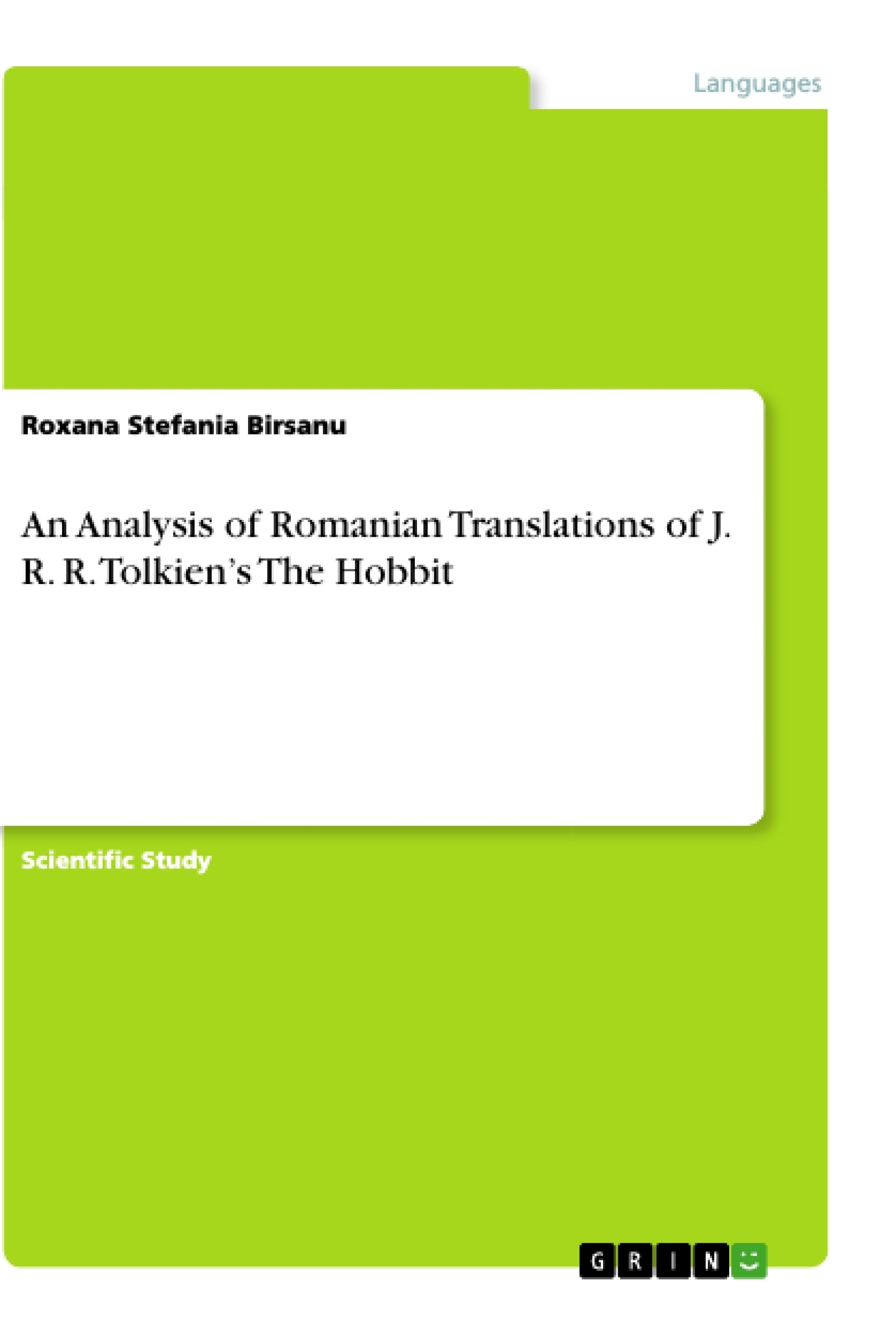This paper deals with Romanian translations of J.R.R. Tolkien's "The Hobbit". Tolkien has acquired a certain status of fame in Romania, but apparently, to the large public, "The Hobbit" is probably more famous than his creator and this is particularly due to Peter Jackson’s film adaptation. However, there are already four retranslations of the novel, which is of no little significance, as this suggests an interest in the book itself. Our analysis relies on the four translations performed so far of Tolkien’s "Hobbit". It was impossible to find the 2010 version signed by Dan Slușanschi that was issued by Paideia Publishing House. However, through the generosity of professor Slușanschi’s son, we managed to have access to the text of the translation.
The aim of this study is double fold. On the one hand, given that the translations were performed in different periods and the time span between them is considerable, we set to identify to which extent they bear the signs of their epoch. The moments of translation production were governed by distinct translation norms which were influenced by the prevalent ideological background, the status of the literary genre to which the novel pertains, the category of target readership envisaged and even the translators’ own agenda, idea on authorship and view of the translation process itself. In close connection with the concept of translation norms, the other objective of the investigation is to detect the overall orientation of the Romanian versions, i.e. whether they tend towards domestication or foreignization.
The research advances in concentric circles, from the more general towards particular elements of the analysis. A significant part is dedicated to the survey of children’s literature, particularly since fantasy is most often included in this subdivision of literature; in addition, three of the four Romanian translations explicitly address children of various ages. Further still, we have also proceeded to a contextualisation of the translations, which includes background information on the translators, but also a general outlook on the status of translations in general and of fantasy in particular in the Romanian literary polysystem at the distinct moments of translation production.
Inhaltsverzeichnis (Table of Contents)
- METHODOLOGY
- GENERAL SURVEY OF CHILDREN'S LITERATURE
- Operational concept: “children”
- Major features of children's literature
- Diachronic evolution of children's literature
- FANTASY
- Features of fantasy literature
- Typologies of fantasy
- Translating fantasy
- The fantasy genre in Romania
- THE AUTHOR AND HIS TEXT
- Biographic information on J.R.R. Tolkien
- The Hobbit or There and Back Again
- ROMANIAN TRANSLATIONS OF THE HOBBIT
- Macrotextual considerations
- Paratextual analysis
- Translation of the titles
- Translation of the poems
- Typographic interventions
- Translation of proper names
- Marks of orality
- Archaisms
- TRANSLATOR VISIBILITY
- CONCLUSIONS
Zielsetzung und Themenschwerpunkte (Objectives and Key Themes)
This study examines the Romanian translations of J.R.R. Tolkien's "The Hobbit," exploring the impact of retranslations on the reception of this iconic fantasy text in Romania. It investigates how these translations reflect changing literary trends, reader expectations, and cultural contexts. The study aims to analyze the choices made by translators and their impact on the overall reading experience.
- The evolution of the fantasy genre in Romania.
- The reception of J.R.R. Tolkien's works in Romania.
- The impact of retranslations on the understanding and interpretation of literary works.
- The role of the translator in shaping the reader's experience.
- The relationship between translation and cultural context.
Zusammenfassung der Kapitel (Chapter Summaries)
The study begins by providing an overview of the field of children's literature, including the evolution of the genre and its key characteristics. It then delves into the fantasy genre, examining its features, typologies, and challenges in translation. The study further explores the author's background, the context of "The Hobbit's" creation, and the impact of its various Romanian translations. It delves into the analysis of the different translations, considering their macrotextual and paratextual features, including title and poem translations, typographic interventions, and proper name translations. The study also examines the influence of orality and archaisms within the translations, and the role of translator visibility.
Schlüsselwörter (Keywords)
The main keywords and focus topics include: children's literature, fantasy literature, translation studies, retranslation, J.R.R. Tolkien, The Hobbit, Romanian literature, cultural context, translator visibility, reception theory.
- Quote paper
- Roxana Stefania Birsanu (Author), 2020, An Analysis of Romanian Translations of J. R. R. Tolkien’s The Hobbit, Munich, GRIN Verlag, https://www.grin.com/document/921248



